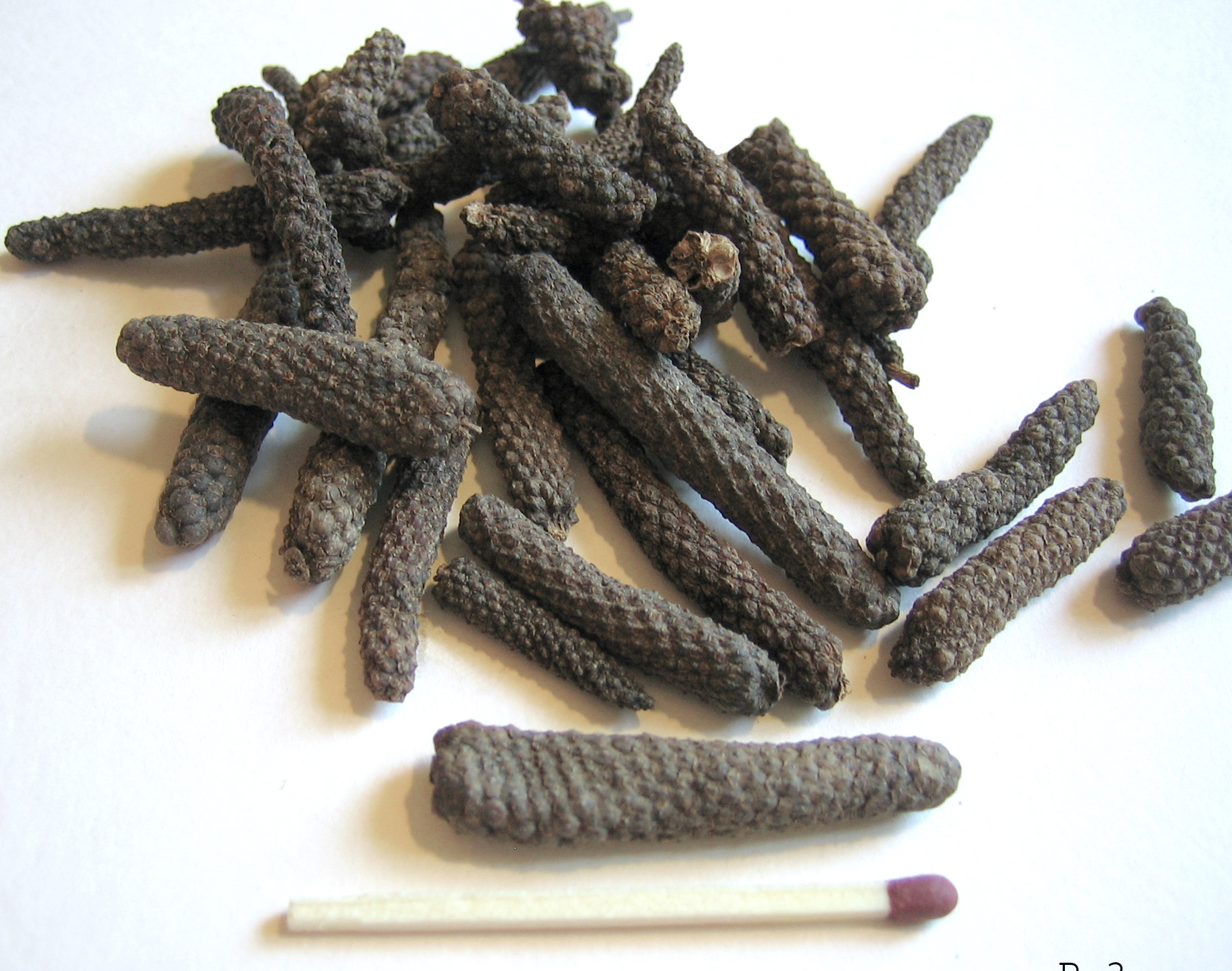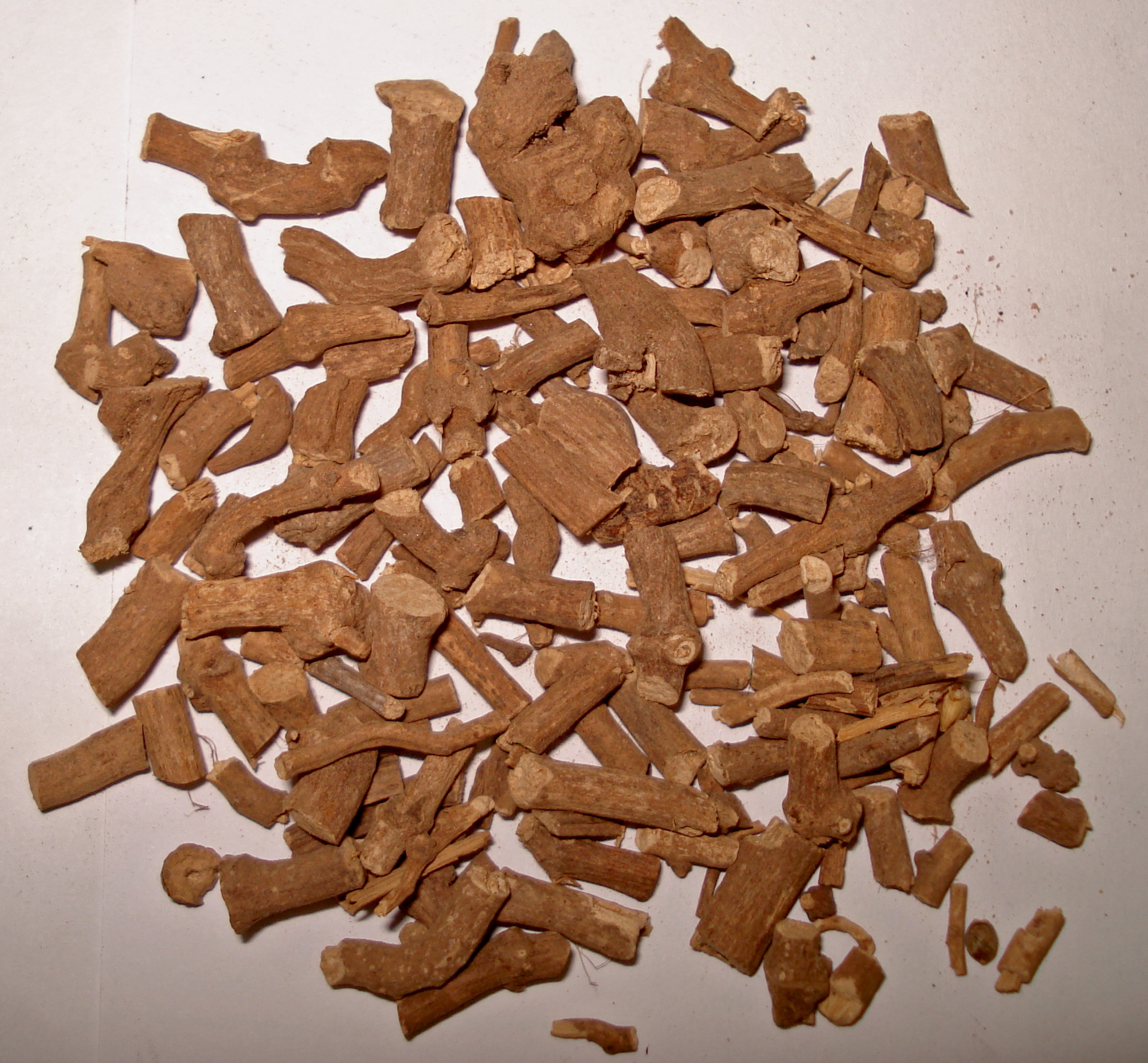Piper longum on:
[Wikipedia]
[Google]
[Amazon]
Long pepper (''Piper longum''), sometimes called Indian long pepper or ''thippali'', is a

 Though often used in medieval times in spice mixes like "strong powder", long pepper is today a very rare ingredient in European cuisines, but it can still be found in
Though often used in medieval times in spice mixes like "strong powder", long pepper is today a very rare ingredient in European cuisines, but it can still be found in
Dangerous Tastes: The Story of Spices
89. Google Print. (accessed October 25, 2005). Also available in print from University of California Press. * pp 427–429, "Black Pepper and Relatives".
flowering
A flower, sometimes known as a bloom or blossom, is the reproductive structure found in flowering plants (plants of the division Angiospermae). The biological function of a flower is to facilitate reproduction, usually by providing a mechanism ...
vine
A vine (Latin ''vīnea'' "grapevine", "vineyard", from ''vīnum'' "wine") is any plant with a growth habit of trailing or scandent (that is, climbing) stems, lianas or runners. The word ''vine'' can also refer to such stems or runners themsel ...
in the family Piperaceae
The Piperaceae (), also known as the pepper family, are a large family of flowering plants. The group contains roughly 3,600 currently accepted species in 5 genera. The vast majority of species can be found within the two main genera: ''Piper'' ...
, cultivated for its fruit, which is usually dried and used as a spice
A spice is a seed, fruit, root, bark, or other plant substance primarily used for flavoring or coloring food. Spices are distinguished from herbs, which are the leaves, flowers, or stems of plants used for flavoring or as a garnish. Spice ...
and seasoning. Long pepper has a taste similar to, but hotter than, that of its close relative ''Piper nigrum
Black pepper (''Piper nigrum'') is a flowering vine in the family Piperaceae, cultivated for its fruit, known as a peppercorn, which is usually dried and used as a spice and seasoning. The fruit is a drupe (stonefruit) which is about in diame ...
'' – from which black, green and white pepper are obtained.
The fruit of the pepper consists of many minuscule fruits – each about the size of a poppy seed – embedded in the surface of a flower spike that closely resembles a hazel tree catkin. Like ''Piper nigrum'', the fruits contain the alkaloid
Alkaloids are a class of basic, naturally occurring organic compounds that contain at least one nitrogen atom. This group also includes some related compounds with neutral and even weakly acidic properties. Some synthetic compounds of similar ...
piperine
Piperine, along with its isomer chavicine, is the alkaloid responsible for the pungency of black pepper and long pepper. It has been used in some forms of traditional medicine.
Preparation
Due to its poor solubility in water, piperine is typic ...
, which contributes to their pungency. Another species of long pepper, '' Piper retrofractum'', is native to Java
Java (; id, Jawa, ; jv, ꦗꦮ; su, ) is one of the Greater Sunda Islands in Indonesia. It is bordered by the Indian Ocean to the south and the Java Sea to the north. With a population of 151.6 million people, Java is the world's mos ...
, Indonesia
Indonesia, officially the Republic of Indonesia, is a country in Southeast Asia and Oceania between the Indian and Pacific oceans. It consists of over 17,000 islands, including Sumatra, Java, Sulawesi, and parts of Borneo and New Guine ...
. The fruits of this plant are often confused with chili peppers, which belong to the genus ''Capsicum
''Capsicum'' () is a genus of flowering plants in the nightshade family Solanaceae, native to the Americas, cultivated worldwide for their chili pepper or bell pepper fruit.
Etymology and names
The generic name may come from Latin , me ...
'', originally from the Americas.
History
The oldest known reference to long pepper comes from ancient Indian textbooks ofAyurveda
Ayurveda () is an alternative medicine system with historical roots in the Indian subcontinent. The theory and practice of Ayurveda is pseudoscientific. Ayurveda is heavily practiced in India and Nepal, where around 80% of the population rep ...
, where its medicinal and dietary uses are described in detail. It reached Greece
Greece,, or , romanized: ', officially the Hellenic Republic, is a country in Southeast Europe. It is situated on the southern tip of the Balkans, and is located at the crossroads of Europe, Asia, and Africa. Greece shares land borders ...
in the sixth or fifth century BCE, though Hippocrates
Hippocrates of Kos (; grc-gre, Ἱπποκράτης ὁ Κῷος, Hippokrátēs ho Kôios; ), also known as Hippocrates II, was a Greek physician of the classical period who is considered one of the most outstanding figures in the history o ...
discussed it as a medicament rather than a spice. Among the Greeks and Romans
Roman or Romans most often refers to:
*Rome, the capital city of Italy
* Ancient Rome, Roman civilization from 8th century BC to 5th century AD
*Roman people, the people of ancient Rome
*''Epistle to the Romans'', shortened to ''Romans'', a lette ...
and prior to the Columbian exchange, long pepper was an important and well-known spice
A spice is a seed, fruit, root, bark, or other plant substance primarily used for flavoring or coloring food. Spices are distinguished from herbs, which are the leaves, flowers, or stems of plants used for flavoring or as a garnish. Spice ...
.
The ancient history of black pepper is often interlinked with (and confused with) that of long pepper, though Theophrastus
Theophrastus (; grc-gre, Θεόφραστος ; c. 371c. 287 BC), a Greek philosopher and the successor to Aristotle in the Peripatetic school. He was a native of Eresos in Lesbos.Gavin Hardy and Laurence Totelin, ''Ancient Botany'', Routle ...
distinguished the two in the first work of botany. The Romans knew of both and often referred to either as just ''piper''; Pliny
Pliny may refer to:
People
* Pliny the Elder (23–79 CE), ancient Roman nobleman, scientist, historian, and author of ''Naturalis Historia'' (''Pliny's Natural History'')
* Pliny the Younger (died 113), ancient Roman statesman, orator, w ...
erroneously believed dried black pepper and long pepper came from the same plant.
Round, or black, pepper began to compete with long pepper in Europe from the twelfth century and had displaced it by the fourteenth. The quest for cheaper and more dependable sources of black pepper fueled the Age of Discovery
The Age of Discovery (or the Age of Exploration), also known as the early modern period, was a period largely overlapping with the Age of Sail, approximately from the 15th century to the 17th century in European history, during which seafarin ...
.
Only after the discovery of the American continents and of chili pepper
Chili peppers (also chile, chile pepper, chilli pepper, or chilli), from Nahuatl '' chīlli'' (), are varieties of the berry-fruit of plants from the genus ''Capsicum'', which are members of the nightshade family Solanaceae, cultivated for ...
, called by the Spanish ''pimiento
A pimiento or pimento (or cherry pepper) is a variety of large, red, heart-shaped chili pepper ('' Capsicum annuum'') that measures 3 to 4 in (7 to 10 cm) long and 2 to 3 in (5 to 7 cm) wide (medium, elongate).
Pimientos can have vari ...
'', employing their word for long pepper, did the popularity of long pepper fade away. Chili peppers, some of which, when dried, are similar in shape and taste to long pepper, were easier to grow in a variety of locations more convenient to Europe. Today, long pepper is a rarity in general commerce.
Etymology
The word ''pepper'' itself is derived from the word for long pepper, ''pippali''. The plant itself is a native of India. The word ''pepper'' in ''bell pepper'', referring to completely different plants (in the ''Capsicum'' family), is of the same etymology. That usage began in the 16th century.Usage

 Though often used in medieval times in spice mixes like "strong powder", long pepper is today a very rare ingredient in European cuisines, but it can still be found in
Though often used in medieval times in spice mixes like "strong powder", long pepper is today a very rare ingredient in European cuisines, but it can still be found in India
India, officially the Republic of India (Hindi: ), is a country in South Asia. It is the seventh-largest country by area, the second-most populous country, and the most populous democracy in the world. Bounded by the Indian Ocean on the so ...
n and Nepalese vegetable pickles
Pickles may refer to:
Dogs
* Pickles (dog) (died 1967), a dog that found the stolen World Cup trophy in 1966
* Pickles (pickleball), a dog often cited as the name origin for the sport of pickleball
* Mr. Pickles, the titular demonic dog in ...
, some North Africa
North Africa, or Northern Africa is a region encompassing the northern portion of the African continent. There is no singularly accepted scope for the region, and it is sometimes defined as stretching from the Atlantic shores of Mauritania in ...
n spice mixtures, and in Indonesia
Indonesia, officially the Republic of Indonesia, is a country in Southeast Asia and Oceania between the Indian and Pacific oceans. It consists of over 17,000 islands, including Sumatra, Java, Sulawesi, and parts of Borneo and New Guine ...
n and Malaysia
Malaysia ( ; ) is a country in Southeast Asia. The federation, federal constitutional monarchy consists of States and federal territories of Malaysia, thirteen states and three federal territories, separated by the South China Sea into two r ...
n cooking. It is readily available at Indian grocery stores, where it is usually labeled ''pippali''. Pippali is the main spice of Nihari
Nihari (; bn, নিহারী; ); is a stew originating in Lucknow, the capital of 18th-century Awadh under the Mughal Empire in the Indian subcontinent. It consists of slow-cooked meat, mainly a shank cut of beef, lamb and mutton, or goa ...
, one of the national dishes of Pakistan
Pakistan ( ur, ), officially the Islamic Republic of Pakistan ( ur, , label=none), is a country in South Asia. It is the world's fifth-most populous country, with a population of almost 243 million people, and has the world's second-lar ...
and the Indian metropolis of Lucknow
Lucknow (, ) is the capital and the largest city of the Indian state of Uttar Pradesh and it is also the second largest urban agglomeration in Uttar Pradesh. Lucknow is the administrative headquarters of the eponymous district and division ...
.
Notes
CHANDRAMOHANAN,R.2017.'Grow bush pepper in pots' Mathrubhumi Malayalam Daily News Paper. 29.12.2017References
*Dalby, Andrew (Oct 1, 2002)Dangerous Tastes: The Story of Spices
89. Google Print. (accessed October 25, 2005). Also available in print from University of California Press. * pp 427–429, "Black Pepper and Relatives".
External links
* Contains a detailed monograph on ''Piper longum'' (Pippali) as well as a discussion of health benefits and usage in clinical practice. Available online at https://web.archive.org/web/20110616192938/http://www.toddcaldecott.com/index.php/herbs/learning-herbs/318-pippali {{Authority control Piper (plant) Flora of the Indian subcontinent Monoamine oxidase inhibitors Plants used in Ayurveda Spices Plants described in 1753 Indian spices